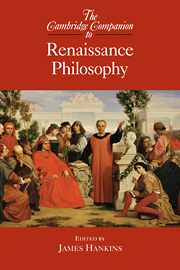Book contents
- Frontmatter
- 1 Introduction
- Part I Continuity and Revival
- 2 The philosopher and Renaissance culture
- 3 Humanism, scholasticism, and Renaissance philosophy
- 4 Continuity and change in the Aristotelian tradition
- 5 The revival of Platonic philosophy
- 6 The revival of Hellenistic philosophies
- 7 Arabic philosophy and Averroism
- 8 How to do magic, and why philosophical prescriptions
- Part II Toward Modern Philosophy
- Appendix: Brief biographies of Renaissance philosophers
- Bibliography
- Index
5 - The revival of Platonic philosophy
from Part I - Continuity and Revival
Published online by Cambridge University Press: 28 November 2007
- Frontmatter
- 1 Introduction
- Part I Continuity and Revival
- 2 The philosopher and Renaissance culture
- 3 Humanism, scholasticism, and Renaissance philosophy
- 4 Continuity and change in the Aristotelian tradition
- 5 The revival of Platonic philosophy
- 6 The revival of Hellenistic philosophies
- 7 Arabic philosophy and Averroism
- 8 How to do magic, and why philosophical prescriptions
- Part II Toward Modern Philosophy
- Appendix: Brief biographies of Renaissance philosophers
- Bibliography
- Index
Summary
“Plato is praised by greater men, Aristotle by a greater number.” This pithy statement by Petrarch (1304-74) in his work On His Own Ignorance and That of Many Others is best read in context. Petrarch goes on in the same passage: “each of them is worthy of praise both by great men and by many - by all, really.” On the one hand, Petrarch reflects here a medieval commonplace, inherited from St. Augustine (354-430): that of all the ancient pagan philosophies, Platonism came the closest to Christian truth. Even more precisely, Augustine said: the ancients who had believed things about the creator that were close to “us” were represented by “Plato and those who had understood him correctly.” This process of “understanding” a past thinker is significant. It is primarily exegetical, and those who embraced it - as many adherents of Platonism in the Renaissance did - assumed that it was their responsibility as interpreters to bring out the truth of the ancient thinker or school that they were investigating.
On the other hand, Petrarch gives voice here to a historically specific sentiment which in the late fourteenth century was finding expression not only in the nascent humanist movement but also in other areas of spiritual and intellectual life, even in the realm of scholastic philosophy: that there was something about institutionalized forms of learning that was not responding to contemporary needs, that there existed a restrictive manner in which knowledge was being channeled, and that institutional structures of higher learning were lending themselves to a sometimes unhelpful social reproduction. The result of this social reproduction was that certain key questions associated with “philosophy” from the days of Socrates were becoming more difficult to answer satisfactorily.
- Type
- Chapter
- Information
- The Cambridge Companion to Renaissance Philosophy , pp. 72 - 96Publisher: Cambridge University PressPrint publication year: 2007
- 13
- Cited by

